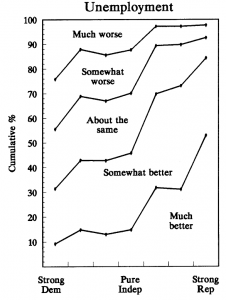I've been getting more than a little comedy mileage out of this story lately, primarily because on the morning of January 3 it was blaring from CNN.com as the headline story. If you don't wish to click through, the headline reads: "Dollar General to hire 6,000" and the story boasts of the many new jobs being created by the discount retailer. For non-American readers, note that Dollar General is essentially the rock bottom of the retail industry in the U.S. The average DG shopper has more food stamps than teeth and can tell you quite a bit about how to tend to a meth lab.
Leaving aside the question of whether surging demand at the store for poor people is really a good sign, of course it's a Good Thing that they are hiring. Nobody disputes that. I'm glad that new people will be hired, even if mostly for minimum wage service jobs. What slays me is CNN's palpable desperation to convince readers that the economy is getting better. As one regular reader noted when I brought up this story on the Facebooks, "Next up on CNN: 3 New Burger Kings Opening In DC Metro Area Thanks to Obama Tax Compromise." It's good news, but the enthusiasm is more than a little…comical, I think.
I understand what CNN and the White House are attempting to do in their mad effort to convince everyone that things are getting better with the 2012 presidential election getting disturbingly close. However, there are two very important reasons to believe that they are wasting their time.
1. There is a strong partisan bias to people's perception of political reality. That is some combination of silly and terrifying – after all, facts should be facts – yet years of research in political science provide ample evidence to support it. To wit: (from Bartels, L. 2002. "Beyond the Running Tally: Partisan Bias in Political Perceptions." Political Behavior 24(2): 117-150)
The above graph (click to embiggen) shows individuals' perceptions of whether unemployment increased or decreased during the Reagan years (1981-1988). The data plainly show that as we move across the ideological spectrum from strong Democrats to strong Republicans, respondents' perception of the unemployment question becomes more favorable. About 10% of Democrats stated that unemployment got "much better" while over 50% of Republicans stated the same. The question of whether unemployment went up or down, and by how much, is not a subjective one. There is a correct answer here.
buy singulair online buy singulair no prescription
Yet a substantial portion of the responses appear to be motivated by partisanship (and presumably, by extension, attitudes toward Reagan). Elsewhere in his paper Bartels provides identical evidence from the Clinton years when respondents were asked to state if the budget deficit increased or decreased over a given time period. This is not an opinion question, yet lo and behold Democrats stated (correctly) that it decreased while Republicans claimed that it grew.
buy temovate online buy temovate no prescription
In other words, even IF the economy shows improvement only the President's strongest supporters are likely to accept that as fact. Yes, there is some marginal benefit with independents and fence-sitters, but the economic news would need to be quite positive for an extended period of time for it to matter.
2. This issue is particularly ill-suited to persuasion. Aside from the role of partisanship, individuals are likely to form perceptions about the economy from their own circumstances and those of their social network. If you are unemployed (and/or you know 10 people who can't find decent work, have been foreclosed, etc.) the media or some candidate are going to have a hell of a time convincing you that the economy has improved. This is an issue on which personal experience and anecdotal evidence are particularly powerful.
In my own experience, I have had a very difficult time convincing myself that the job market in my field has improved (in fact, hiring is up slightly this year). Why? Because I'm still looking for work and my social network is filled with a dozen other people unsuccessfully searching for full-time work. The result is a fairly natural reaction: we accept that the numbers might be improving but reject the idea that the economy is getting better until our own circumstances, and those of our friends/family/colleagues, start to get better.
I tip my hat to the White House and the media for making the effort, but it simply isn't possible to talk people into believing that the economy is improving. Getting that idea to take root among the voting public will require, you know, actual economic improvement…and even then half of America won't believe it. We have ample evidence, in the timeless words of The American Voter, of "the role of enduring partisan commitments in shaping attitudes toward political objects."
